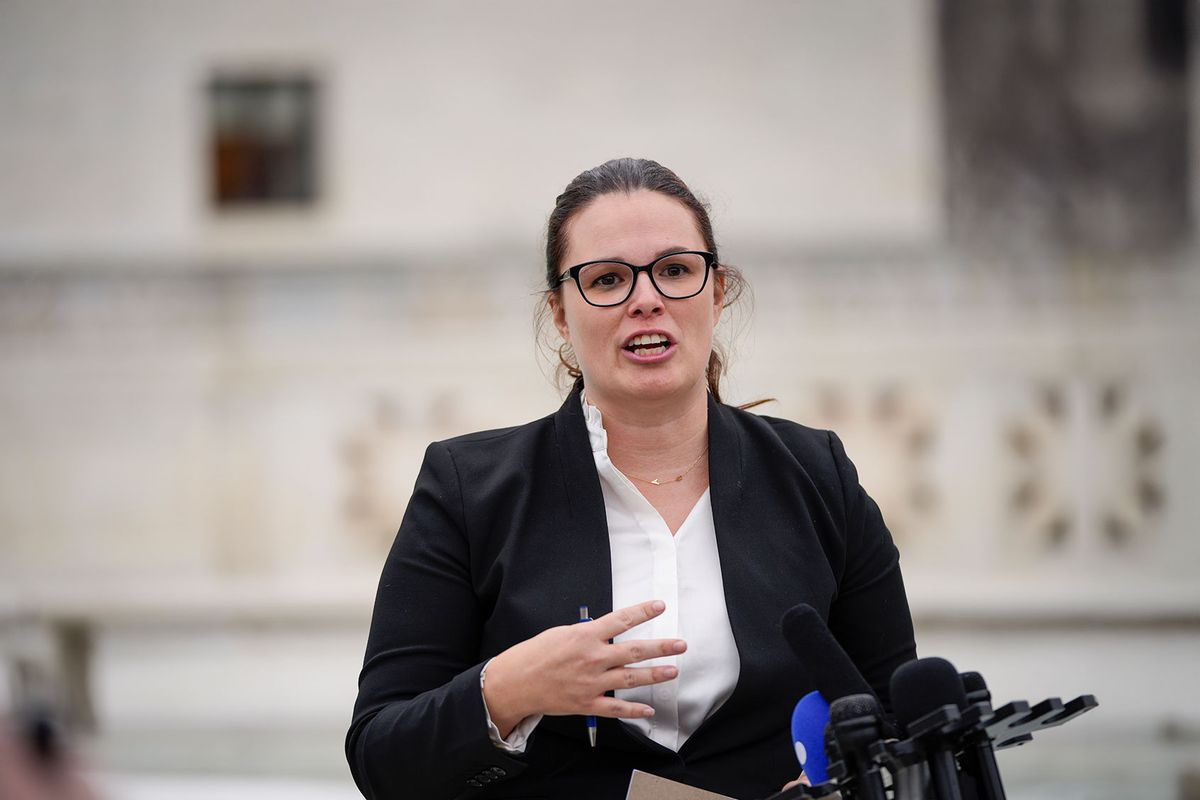A North Carolina judge's effort to overturn his electoral defeat by tossing out thousands of votes is "fatally flawed," "unlawful and unwarranted" as it threatens to disenfranchise scores of North Carolina voters, state Supreme Court Justice Allison Riggs argued.
The Democratic justice's late Tuesday rebuke refutes the election protests of her opponent, Appellate Court Judge Jefferson Griffin, who trails Riggs in the state's Supreme Court race by just 734 votes. Griffin, a Republican, has asked the North Carolina Supreme Court to force the state Board of Elections to throw out more than 60,000 votes that he claims, in part, are invalid because voters' registration applications were incomplete.
In her reply brief, Riggs, who has recused herself from the case and intervened as a defendant, urged the state Supreme Court to reject Griffin's petition. She argued that ruling in his favor would set the stage for future candidates to retroactively challenge election rules when they lose a race while upending North Carolinians' faith in their electoral process.
"Never again will North Carolina voters walk out of the voting booths knowing that their votes will count, and the court system will be flooded with lawsuits after every election seeking to challenge votes all over the State," Riggs said. "That result is untenable and should be rejected by this Court not only for the sake of this race, but to avoid undermining the public’s confidence in every election going forward."
Riggs' win was confirmed late last year by two recounts, one by machine and another partially by hand. The Democratic-led North Carolina Board of Elections rejected Griffin's electoral protests in mid-December, prompting his suit.
Griffin claims that the state Election Board erroneously and unlawfully counted more than 60,000 votes he alleges are invalid because voters' did not fully complete their registration applications, omitting driver's license information or social security numbers. In some cases, voter registration applications are incomplete because voters weren't asked to provide that identification information.
The Republican judge last week urged the Republican-majority state Supreme Court to first consider tossing 5,509 votes cast by overseas voters, which he says are invalid because they do not include accompanying photo identification. He also asked that the court postpone consideration of the other issues he raised pending a determination. Tossing out those votes alone will hand him the victory.
But Riggs sounded the alarm about Griffin's suggestion. Should the court oblige, she argued, they would disenfranchise U.S. service members, their families and other overseas voters who voted absentee using a standard federal form or secure portal specially created to aid military members in voting.
Plus, Griffin only flagged absentee votes of North Carolinians registered in four heavily Democratic counties — rather than from all 96 counties in the state, Riggs added. She said that expanding the photo ID rule retroactively to absentee ballots from every county would balloon the number of North Carolinians affected by Griffin's protest to more than 30,000.
"This Court could not order the removal of votes in four counties, while leaving votes from similarly situated voters in all other counties untouched," she said, arguing that it "should not open that Pandora's box."
While Riggs acknowledged how unusual it was to ask her colleagues on the court to reject Griffin's requests, she emphasized the importance of their decision in upholding the rule of law and reviving public confidence.
"In a State where we openly celebrate that all power derives from the people, the best way to achieve these things is to leave this matter in the hands of the voters who followed the rules in place at the time of the election," she said.
Earlier this month, the North Carolina Supreme Court granted Griffin's request to temporarily block certification of the election to consider his claims. Two justices dissented, one Republican and one Democrat, with the Republican justice warning of the harm to the state's election integrity in effectively stripping North Carolinians' right to vote after the election has occurred.
In a separate brief filed Tuesday, Riggs also asked the state Supreme Court to hold oral argument in the case, arguing that doing so will aid the court and the parties in better understanding Griffin's requests and bolster "public confidence in the fairness and integrity of our judicial system."
Griffin's election challenge is currently before both the North Carolina Supreme Court and the Fourth Circuit Court of Appeals, which is considering Riggs' appeal for the matter to be handled in federal court.
The state Supreme Court is reviewing briefs from the parties. The Fourth Circuit will hear oral argument on Jan. 27.
Read more
about North Carolina



Shares